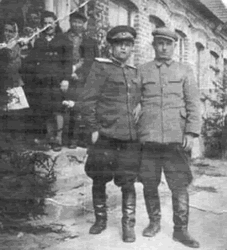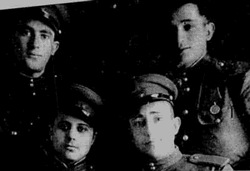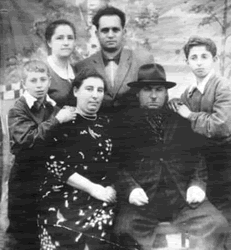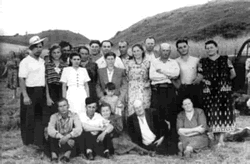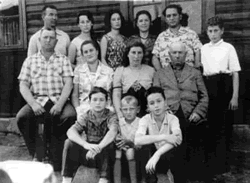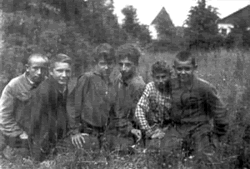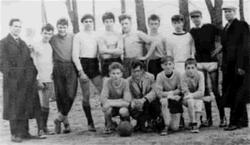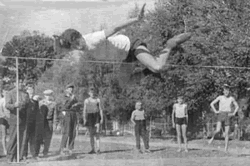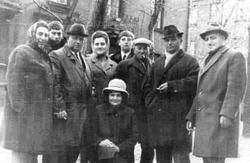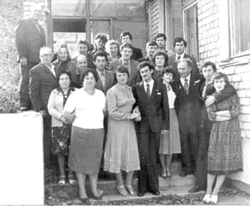Memories of Solomon, son
of Orchik Alperovich
Jewish Life in Kurenets After the Holocaust
Written in English by Shlomo Alperovich
Edited by Sandra Krisch
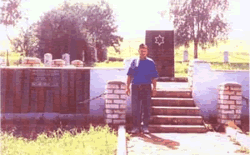
Shlomo Alperovich
near the memorial for the
1050 Jewish people from Myadel street, Kurenetz (2001)
I was born in “shtetle” Kurenets (Belarus) in 1948, and I wish
to share my own memories and stories that I heard and remember from Jewish
natives about Jewish life in Kurenets and its surroundings.
After the liberation of Belarus (including Kurenets) in 1944, Jewish people
started returning to the area. Kurenets was almost completely destroyed
and burned by the retreating German Army. Only a few houses were left
standing. Most of the surviving Jews immigrated to Palestine and the United
States in the next few years.
My father, Alperovich Aaron Abramovich (Orchik son of Abram, grandson
of Chaim Isar; born in 1896, died in 1974) returned home to Kurenets from
Saransk (Mordovia), where he had been sent in 1939 (when the Soviets came
to the area). He was sent there by decision of Stalin's court for 5 years
of hard labor. When he returned he found neither home nor family. His
wife Mirel and 3 of his children (Chaim Isar, another son, and a daughter)
had been murdered.
Kurenets (1945) - Miron
Meckler and Aaron Alperovich
From local residents and Jews
who returned from the forest, he found out that his older son Yakov (Yankel)
joined the partisans during the war. He was informed that he was recruited
to Belpolk — a Red Army unit that was supposed to search and clean
the Belarus forests of Nazi soldiers and local collaborators (politzais)
who were now replacing the Jews and hiding there. Father finally found
Yakov near Minsk. He was very skinny and very tired. He learned from him
that Yankel's sister and brother, his daughter Lisa, and his son Shmuil
survived, and that during the war they also joined the partisans' ranks.
In the Red Army
Above: Benjamin-Yosef Sosensky, Yakov Alperovich (from Kurenets).
Sitting: Levi Koton and Dov, son of Chykel (lives in Minsk)
Yankel Orchik's story is well known and told in many books. On Simchat
Torah of 1941 his family was taken to be killed. His mother was able to
escape with the younger children while they walked to the forest. Yankel
and his brother Chaim Isar were taken with the other Jewish men. The men
were put in groups of ten and killed, while many of the local population
were watching. Just before it was Yankel's turn to be killed, he said
that Yente (nee Dinerstein) Rodanski was let go by the Germans and was
told to never marry a communist again (they had just killed her husband,
Velvel Rodanski). Yankel realized that all are not equal, and he demanded
to speak before he was killed. The German officer let him talk. Yankel
said in broken German “Before I am to be killed I would like to know
if my sin is being a Jew or being a communist.” The officer answered,
“Clearly, being a communist.” Yankel said, while turning to
the local people, “They could all tell you that my father Orchik
was sent to Siberia for being an enemy of the Soviet people; why would
I then become a communist?” The officer liked what he [Yankel] said,
and maybe it was the broken German that made him laugh—he told him
to stand to the side. Yankel said that his sick brother should be let
go first, and they let Chaim Isar go.
Yankel did not trust the Germans, and together with the sons of Pinia
Alperovitz he escaped to the woods. They [the others] were killed. Yankel
survived and later joined the partisans and saved many many Jews from
Kurenets and Myadel and also his brother Shmuil.
In 1944 my mother, Botwinnik Evgeniya Samuilovna (Zelda daughter of Shmuil
Botwinnik, born in 1920 in Rakov) came to Kurenets. After her release
from the partisans she looked for her relatives. She found out that all
of her family was killed in Rakov. She moved to Kurenets, following some
of her Jewish friends from the partisans. And that is how two lonely people
met each other and established a family. At first they lived in the house
of Aaron's brother Hirsh, who was killed with his entire family (wife
and two children). Here, in August of 1946, their first son, Abram, was
born. At that time Arye Leibe (Lior's grandfather), the brother of Aaron
[Orchik Alperovich] returned from evacuation to Russia; their two sisters,
Hava and Feiga, also returned after being partisans during the war. They
all married and started their own families. My father moved to a new house
of his own, which he built with his own hands; he left the old house to
his brother Leibe and sister Hava.
In July of 1948, in the new house, a new citizen of Kurenets was born
— that was I. About my birth I will tell you the following story:
My mother felt that she was about to give birth, so my father took her
to the Vileyka's hospital, which was 8 km away, riding on a horse. However
it was too early, and after one day in the hospital she asked to be taken
home because she had a lot of work to do there. And so my father brought
her back. A few days later he had to set the horse again to take mother
to the hospital. This time she was left there for several days, while
my father had to return home to take care of the housekeeping chores.
A few days passed and then a fellow Kurenets resident by the name of Nikolay
met my father and told him, “Vorchik, I've visited my wife in the
hospital and saw your Zelda. You have a boy.” Father took a horse
and went to meet us. Mother asked to go home right away, so father took
off his jacket, put me inside, and brought me home. That is how my life
in Kurenets began.
Alperovich family - Kurenets, 1959
At that time almost every Jewish family in Kurenets had a newborn. About
15 Jewish families remained in Kurenets after the war. On Saturdays and
at Jewish holidays Jewish people gathered at the old Leizer Shulman house.
There they had their prayers, and after the religious ceremony they were
drinking L'chaim. We kids played outside the house and never forgot that
Leizer had an apple orchard. We, all the Jewish kids, were raised together
among the other gentile kids — together we went to the river and
to the forest. Sometimes we had our fights. During the winter we would
build snow forts and have snowball battles. Starting at the age of 7,
every kid in Kurenets would attend school; there we met with new duties
and challenges and made new friends.
In 1955-56, many Jewish Kurenetsers started moving to Poland in order
to continue on their way to Israel. Since Kurenets was part of Poland
before 1939, the Soviets let the old Polish citizens cross the border
to Poland. The first family to take that step was my father's sister Hava
and her husband Boris, with their 5 children. The oldest child was 7 years
old and the youngest, Sholom, less than a year. I still remember his brit
milah ceremony: all the Jews of Kurenets gathered together in the small
room and then came the rabbi. All the Jews raised the money to pay for
his services. That is how the last Jewish child was born In Kurenets,
and that happened in 1955.
Surviving Jews from the area of Vileyka meet in Naarch'
Many families followed that path, moving directly to Poland or to the
larger cities in order to arrange the needed papers and then move to Poland.
So in 1958 only two Jewish families were left in Kurenets: Levin's and
ours. But Jewish life didn't stand still. At every holiday the older children
of my father would visit us with their children. Also we kept in touch
with the Jews in nearby villages: Dolginovo (4 families), Lyuban (7 families)
and Vileyka (about 15 families). The spiritual leader of the remaining
Jews was Mironovich (Finkelshteyn-Tewel) the head of the Lyuban sovhoz
[state farm].
In 1958 a new school director arrived in Kurenets — Catznelson. He
lived in Kurenets till 1963. The head doctor of the Kurenets regional
hospital was Dr. Nasis. He lived in Kurenets from 1960 till 1966. They
both had children younger than school age.
Alperovich family in grandfather's house (1960)
At the Kurenets public school between the years 1958 and 1966, only two Jewish kids studied: my older brother, Abram, and me. Despite this, we never felt excluded and participated in all kinds of social activities; along with the other students we went dancing and training. Abram even won a regional championship in throwing the discus. We participated in all-night parties in the nearby villages and hung around with boys and girls of our age, but what we were missing were Jewish friends.
Kurenets (1961) - childhood friends
Left to right: Petya, Tolik, Abram and Shlomo Alperovich, Lenya
Abram finished school in 1964 and went to Brest to study pedagogy. I finished
school two years later in 1966 and went to Minsk to study engineering,
but it didn't mean that we left Kurenets. Every holiday we returned to
visit our parents.
Kurenets soccer team, champions
of the Vilekya area (1964)
Abram Alperovich is 5th from left
Kurenets (1964) - Abram Alperovich jumps
Abram finished school in 1964 and went to Brest to study pedagogy. I finished
school two years later in 1966 and went to Minsk to study engineering,
but it didn't mean that we left Kurenets. Every holiday we returned to
visit our parents.
After finishing my studies in 1971 I returned to the Vileyka region to
work. I was the head engineer of Kolhoz, and later a regional agriculture
machinery engineer. At that time my brother Abram was already a math teacher
in Vileyka's school. Almost all the Jewish kids of the Vileyka region
received a higher education.
Estony, Tallinn (1971) -
Abram's wedding
Left to right: Zelda, Shlomo, Samuel, Lisa, Misha, Aaron and Yasha Alperovich,
Victor and Bunya Kempin
Abram finished school in 1964 and went to Brest to study pedagogy. I finished
school two years later in 1966 and went to Minsk to study engineering,
but it didn't mean that we left Kurenets. Every holiday we returned to
visit our parents.
Soon Abram got married and moved to Tallinn (Estonia). In 1974, my father
passed away. It happened in January and it was very cold outside, but
still many Jewish and also local (gentile) populations came to pay him
their final respects. Among the locals he was a well-known authority.
Everyone who had to buy or sell a cow went to Aaron (“Vorchik”)
to ask for help in [the form of] advice or even in [case of] a shortage
of money. I still remember how some of our Russian neighbors cried at
the funeral and kissed his legs.
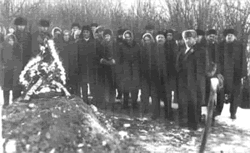
At the funeral of Aaron Alperovich (1974)
All the Jews of the region came together
My mother and I, in 1975, sold our house and left Kurenets and moved to
Tallinn. I would still come to Kurenets for visits. One time, it was in
1981, I went there after getting married; just after the wedding ceremony,
my wife and I flew to visit my father's grave. At that time I learned
from local non-Jewish citizens who still remained there that they [the
Jews] are all called “Vorchiks” by the nearby villagers—that's
how deep and lasting was the memory of the last Jewish family that lived
in Kurenets.
Vileyka (1984) - Wedding of Taisa Alperovich and Jenya Hayet
After us, there was only one Jewish family left in Kurenets — Issak and Jeniya Levin. Issak passed away in 1990 at the age of 90, and his wife moved to Svetlogorsk to live with her sister. Before leaving the USSR and moving to Israel, in 1989 my brother Abram and I visited Kurenets and our oldest brother Jacob (Yankel), who lived in Molodechno and worked not far from Kurenets in sovhoz Lyuban with Mironovich. He organized the placement of a memorial at the graves of those who died in the Holocaust. At this visit in Kurenets we met our old neighbor Felsher Shuberty (born in 1918). While talking to him we found out that he was a Jew, something that we didn't know before. We lived near him from 1956 until 1975, went to school together with his children, and didn't know of his being a Jew. So, since 1990, he is the last Jewish settler in Kurenets, he is the one who welcomes visitors who come to Kurenets, and he is the one taking care of the Jewish graveyard.
My brother Abram and I have
lived happily with our families in Israel for 10 years already. Our brother
Yacob also immigrated to Israel, but he passed away in 1996. My other
brother, Samuil, is still living in Belarus.
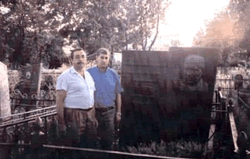
Shlomo and Lev Alperovich by the grave of Miranovich, Vileyka (2001)
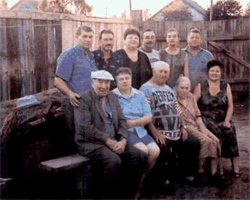
Belarus, Hoyniki (2001). Samuel Alperovich's family
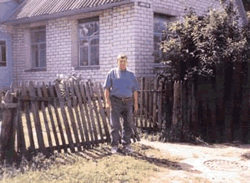
Shlomo Alperovich near the house he was born in - Kurenets (2001)

At Abram's house after the funeral of Yasha Alperovich - Israel (1996)
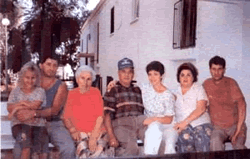
Alperovich in Israel - Afula (1994)
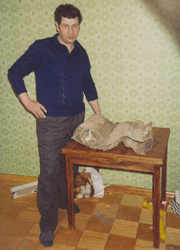
Shlomo (Soplomon) posted
the core of the story of Solomon in the Kurenets guest book some years
ago. I emailed Shlomo and received his phone number in Israel as well
as the number of his brother, Avraham, who lived next door to him.
I called both brothers and was amazed because without looking at notes
they recalled every person who lived in Kurenets. They had a very interesting
way of recalling people. The year in which the person was born and many
times also the year in which he or she passed away accompanied every
name. They both recalled every Jew who lived in Kurenets or nearby after
the war. They also remembered every Jew who came for a visit...it was
amazing! Some of the information they gave me was added to Shlomos'
story. I am sorry to say I did not write much of the information down
while talking to them and it therefore must be recorded in the future.
I received a phone number in Chicago of the daughter of Chaia Aada nee
Benes,
For the story of the Benes family go to http://www.jewishgen.org/yizkor/kurenets/kur090.html.
The daughter of Chaia Aada was the only survivor of her immediate family
and she was the same age as my grandmothers’ youngest sister; Chana
Shulman ( perished with her parents in 9-9-1942 ) whom she told me was
one of her best friends.
In June of 2003 I received an email from Ruth of YUSSR. She wrote that
there is a torah in their office that was given to them in the Soviet
Union by a Mr. Alperovitch from Kurenitz and that they had lost touch
with him many years earlier. I immediately knew that it was Shlomo Alperovitch
who they are looking for and gave them information about the history
of the torah as well as of the history of the family. I also sent his
son, Sasha’s email address...I am posting the emails sent by Ruth
and Shlomo....
Eilat Gordin Levitan.
Sent: Wednesday, June 25, 2003 10:55 PM
Subject: your torah from Kurinetz
Dear Shlomo -
I am writing to you today with an interesting story. Our organization,
YUSSR works with Jewish children in Belarus. About 13 years ago, Eli
Krimsky was given a torah to smuggle out of Belarus. The person was
making aliyah and had a sefer Torah, and your name. Eli Krimsky brought
it back to the US.
We have the torah in our office and would like to get the history of
the torah. We would eventually like to give the Torah to a musuem -
with permission, of course. Here is the story, which Eli wrote to me
- please let me know if this is your family. One of my adult Hebrew
students invited me to her home to show me a 'Torah.' I think both Josh
and I went and just assumed we'd have some tea and look at her little
simchas torah paper torah. She then pulled this out and we almost dropped.
I distinctly remember seeing it open to the parsha at the end of Balak
and the beginning of Pinchas - where it discusses the zeal of Pinchas.
I shook when I realized that. The idea of revenge - here's a Torah that
survived the Holocaust open and stuck on that specific parsha. I immediately
started writing down information about the Torah and knew that I needed
to get it out of the USSR, although it was made clear to me that any
artifact smuggled out from before WWII was illegal.
Anyway, here's what we found out. The village of Kurinetz was an all
Jewish village in White Russia near the city of Minsk. Between 1941
and 1942 the nazis occupied Kurinetz, gathered the villagers into the
synagouge, and torched it with the sifrei Torah and villagers inside
r'l. A non-Jew named Konstantine Bakatz, who lived in the nearby town
of Melnicki, saved the Torah and hid it in his his basement all the
years of the war. He gave it to the father of Shlomo Alperovich (and
other Jews who returned to Kurenets after the war) who kept it hidden
in his basement. Shlomo was born after WWII and his father died many
years later.
Shlomo Alperovich, his mother, and two children emigrated to Israel
on March 25, 1991. Shlomo knew that he would be thoroughly searched
upon his departure from the USSR but he wanted the Torah removed, but
knew it was illegal to remove it. He relayed the story to me, and gave
me the Torah with the hope that I, an American citizen, would be able
to remove the Torah from the country. On March 28, 1991 I packed the
torah in my duffle bag and with the help of God, had it removed from
the country. Best regards and I look forward to hearing from you.
-Ruth Rotenberg
.
To: YUSSR
Hello,
I was glad to hear from you, and would like to contribute some information
about the torah: I was born in Kurenetz in 1948, and the story of the
Jewish life in Kurenetz after the WW2, by me, you can find in www.eilatgordinlevitan.com,
in the Kurinetz section. Since childhood I remember that there was a
torah in the house, on the closet, which was half burned, and was hidden
in a box from a "Singer" sewing machine. My father told that
when he returned after the war, an old citizen of Kurinetz named Bakatch
came to him and told him: "Orchik, come I'll show you something",
and when father came to his place he was given a half burned torah,
which he rescued from the burned synagogue of Kurinetz. Before the war
there were 3 synagogues in one street in Kurinetz. And so it it was
kept in Kurinetz this was untill 1974, while my father was alive. In
1974 me and mother Zelda moved to Tallinn, Estonia where my older brother
lived. In 1991, when we were about to move to Israel, I was studying
Hebrew in the Tallinn' Jewish school and met 3 Jewish guys who came
from the US there. I invited them home to see how Jews lived, and gave
them the torah since it was hard to be to smuggle it out of the country.
One of those guys, Reuben Taragin left me his phone number in the US.
In 2002 I've called him, and he told me he gave the torah to a museum,
and it made me very happy to know it found it's proper place. I've also
informed that to Mr. Shimon Zimerman, the chairman of the Kurenetz descendants
community in Israel. Hope that helps,
Don’t hesitate to address me with any further questions,
best regards
Shlomo Alperovich
Shlomo and Avraham to me that because of Bakatz testimony they authorities
were able to bring to justices
A non-Jewish resident of Kurenets who collaborated with the Nazis and
actively participated in the killing of his Jewish neighbors. Their
brother, Yankle found the collaborator (The collaborator fled Kurenets
as soon as it was liberated in 1944). The man would have gone free since
his Jewish victims perished and all others refused to testify fearing
reprisals by his family members who still lived in Kurenets.
The Jews protected Bakatz from reprisals. Years later the man was released
and returned to Kurenets.
Shlomo and Avraham who (were still kids at that point) wanted to kill
him. Eventually they let go of the plan and ignored him every time he
walked near them.
Many wrote about Bakatz in the Yizkor book.
Am working on a translation of a poem that was written about Bakatz
and the torah in The Yizkor book for Kurenets;
It is the very first draft and I have a long ways to go.....
Bakatz
By Ahoron Meirovich
And I didn't know his deeds of kind
Nor the nobility of his soul
Of my ravished home the remnants wailed
Of the testament they had to recall
There was a goy, a solitary dweller of my homestead
Yesteryear no one was his confidant
No one conceived that this son of a stock we dread
To a righteous mankind belonged
Until something started brewing in the center of the earth
Days of horror, boulder of genesis
These chronicles they called out in their hurt
My brothers, the sons of my hometown, the vestiges
And on their faces ruins imprinted
A raven shadow, while they told what they had to say
And only when Bakatz tribute they recited
Light passed through and I saw a ray
And it was, they told, time when our blood was spilled,
Time when every son of evil eradicated our cherished
Only he, seeing them standing in line waiting to be killed
Supported them and cried for the perished
And this man put his life in his hands
He threw his soul to the other side
to consult a tormented Jew and to heal him
To be his staff and his support
but the glory of the man and his special spirit was discovered later
on
And they asked us to keep their testament and its candle as an eternal
flame
that will never be extinguished It happened that great tidings spread
that the enemy (that wanted our destruction) came to the day of judgement
They told of the transfer from darkness to light the remnants of the
violated Israel
Then we returned, leftovers from forests and corners, but there was
no ray of light for the returned
They didn't walk in glory as heroes of battles -
Bodies as extinguished flames
Dark mood, humiliation, capture
Only dust, not a hint of salvation
Hills of extinction, rupture on top of rupture
The footprints of a community in desolation And when on the ashes of
the dead community
The hobbled vestiges sat
Bakatz humbly approached the remnants
Mourning, he sat in the midst Quietly he sat, to a point of depression
he was subdued
And he was like the community in her essence
Until this man expressed what he had to tell
- it was lower than the ashes I know that the depths wronged you, crimes
to the deepest crippling wound
And my heart fills me with a desire to console you
However, first I have something holy of yours
Envision, you three Jews, only the elderly and those who lived through
many days, since the thing is pure and very holy and holds many sorrows
and blood
Then we answered what we had to say to the man
Here, look at us the remnants - there is no more difference between
us
the young and old after leaving the core of torment
Look at us. We returned from misery and from the forest as one destroyed
In these remnants a child and a teenager are very old, they are sons
of gray
When you add the souls of the remnants
they were endowed with age when they pass through the trail of fire
And each child is holy and pure like an old man
So choose the ones you would ask for Three he then took in union
From the leftovers of the remnants as his heart wished
And they walked silently with him and joined him
With Bakatz, the three to his abode Confounded as to what he was going
to do
They sat in his home, the three
And they watched as he took a cloth and covered the picture of the holy
mother
And they watched as he went to one of his barrels and took from the
well
In this water he washed his hands and they looked on without understanding
What is this unexplained
work
What hint will this ceremony endow
And why is he taking a white tablecloth
And covering the table with it And two candles' fire he lit
And placed on his table across from them
And he kneeled on the floor and uncovered a trapdoor
Into the basement he descended on a ladder
While they sat wondering in silence
As to what was occurring
Then they saw that the trapdoor to the basement again was lifted
And palpitating were their hearts They saw the man, but not alone
He ascended from the darkened basement
A Torah book in his hand he held
And their eye filled with tears And then on the tablecloth splendor
He laid it down slowly
Their soul understood the grandeur
Bakatz with a shaky voice: Maybe it would be considered a sin for me
On this holy book to put my hands
But my witnesses above
In purity and fear I guarded your book with me
I knew that one of you would return
And I guarded it for you
For when your hearts will ask to heal
And there would be no one to answer to you
I knew that very anguished you would rejoin…
But Bakatz his assertion didn't resume
As tears and convulsions overcame him
And his voice in his tears was consume - - -
On the Torah book that was left as a shrine
The three lamented inconsolably throbbing
And Bakatz from a corner, joined in their pine
The righteous giant was sobbing
My brothers, all of this they told with a tear
They told and requested while weeping
That the memory of this venerable dear
Would be printed on the table of our heart for keeping.
Eilat
.
